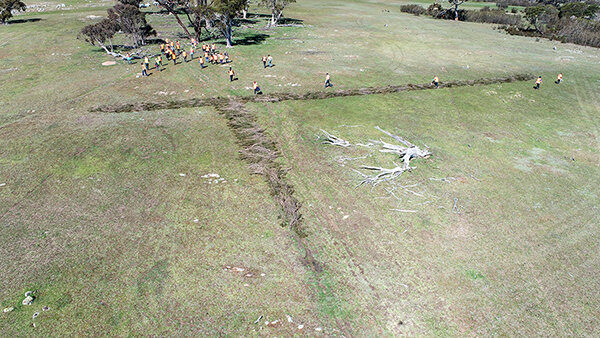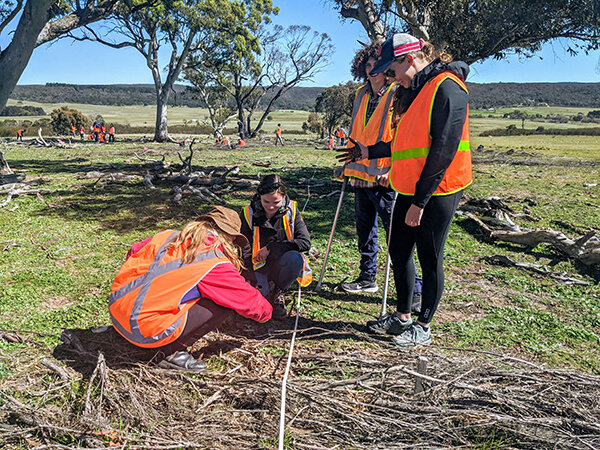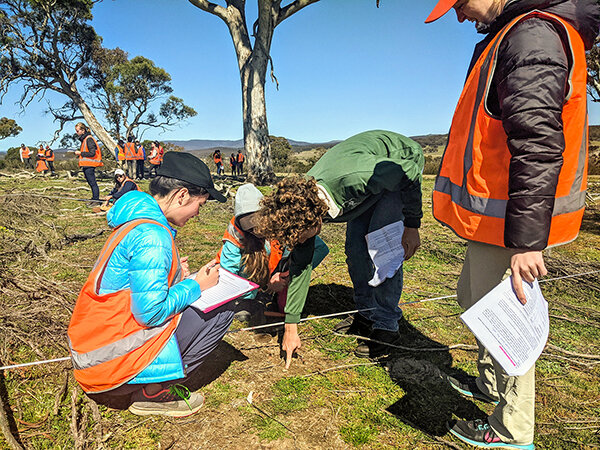Completed 2020 brush packs placed on contour, with additional brush covering rill running downslope.
The Mulloon Institute hosted the annual ANU Environmental Science Field School at Mulloon Creek in September which was organised by Dr David Freudenberger with assistance from Dr Helen King, Dr Richard Thackway, Mauro Davanzo and others. TMI’s Research Coordinator Luke Peel helped to facilitate proceedings onsite at Mulloon.
Unfortunately, the field school was reduced from the usual three days of fieldwork to one due to COVID-19 restrictions on transporting large student groups, with many students driving their own vehicles to Mulloon.
Students were able to use their recently acquired skills in conducting Landscape Function Analysis (LFA) on existing brush packs installed by the class of 2018. The data students collected is part of an ongoing assessment of how brush packs can be used to regenerate degraded land and assess the level of success. They also used this assessment of past works to provide ideas of what worked and if possible, what could be done better.
Sampling soil in existing 2018 brush packs.
The students selected a new area which happened to be further downslope of 2018 brush packs, where rills had developed and small scald areas due to animal pathways to the nearby water point and long term issues with runoff from upslope.
The brush packs will slow water runoff (de-energised water), help trap soil, seeds and nutrients from upslope which will encourage more water infiltration, reducing the amount of runoff down the next slope step in the landscape, that would further erode the existing rills.
Brush packs were used to cover the rills to protect the soil from rain-splash impact and reduce animal traffic to help the eroded areas repair. The brush packs were almost a metre high, and will drop their leaves adding organic matter to the soil surface and helps trap water, soil and nutrients including seeds. The brush pack allows plants to germinate and grow to maturity as they are protected from grazing animals who prefer not to get poked in the face by the brush.
It’s always good to have ANU students visit Mulloon to apply their scientific skills and see how this relates to practical land rehydration and regeneration techniques that help farmers and land managers repair country.
The Mulloon Rehydration Initiative is jointly funded through the Mulloon Institute and the Australian Government’s National Landcare Program and is supported by various affiliates.
Testing soil surface resistance below 2018 brush packs.
Student reflections
“Luke Peel was adamant that for meaningful, long-term landscape restoration to occur, land managers needed to change their outlook on land management, to see a landscape as it has been and as it could be. This really highlighted to me the critical importance of effective science communication in creating meaningful change.”
“Regenerative agriculture seems like a new way to manage the landscape holistically.”
“I wondered how, at home we might be able to implement some of the techniques being used at Mulloon to protect our soils from erosion and compaction when we return livestock to the paddocks.”
“Initially, my opinion towards conservation was that agricultural land should be ignored or revegetated to become forest. I felt very cynical of the concept of environmentally-friendly agriculture. Coming out of this course, I’ve recognised the importance of working with what has been done and seen that there is true merit in teaching more eco-friendly farming values to landholders.”
“Listening to Luke Peel and have him impart his knowledge and experience on us served to illustrate that policy is not the be all and end all in land management. The idea that farms could work together within a region and increase their land functionality and therefore productivity was not something I had considered before, as so much of my background had centred around policy being the one and only thing that allows for change.”
“Learning about this institute [Mulloon] inspired me to look into studying further into sustainable agriculture as I believe it is the way of the future. I have started looking into sustainable agriculture master’s degrees where I can mix my skills that I have learnt in my undergraduate degree with new skills within the sustainable agriculture field.”


